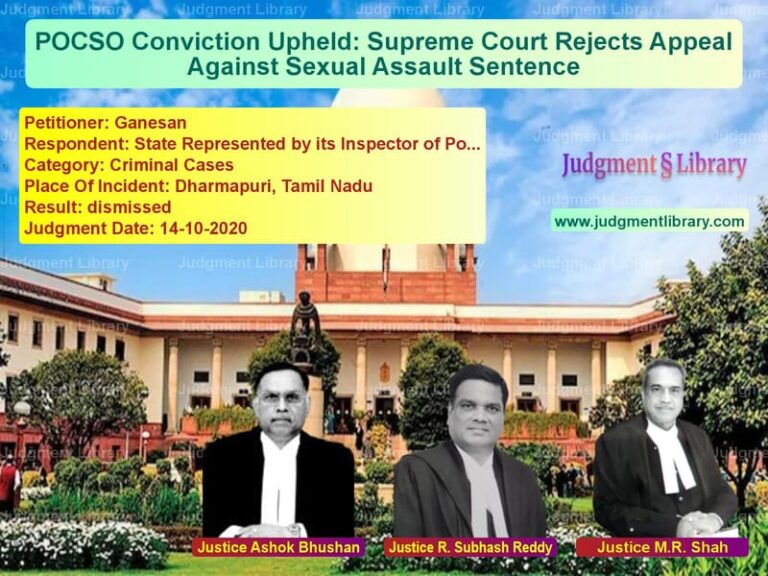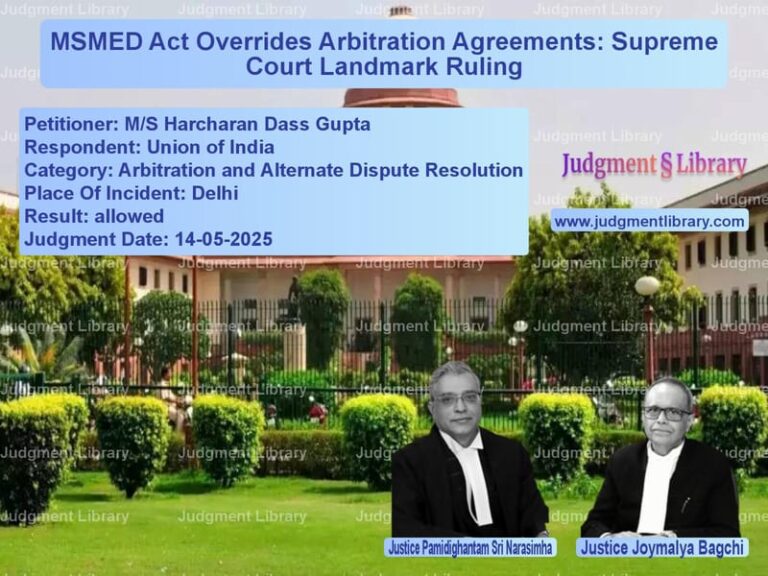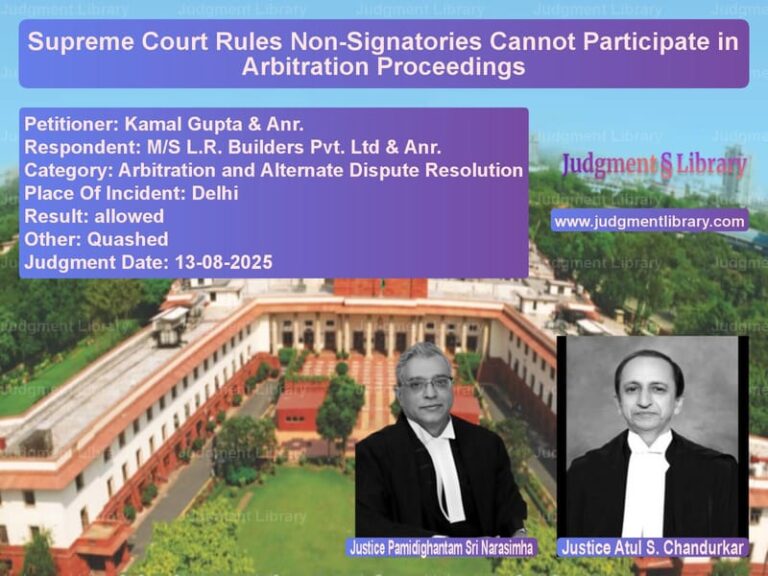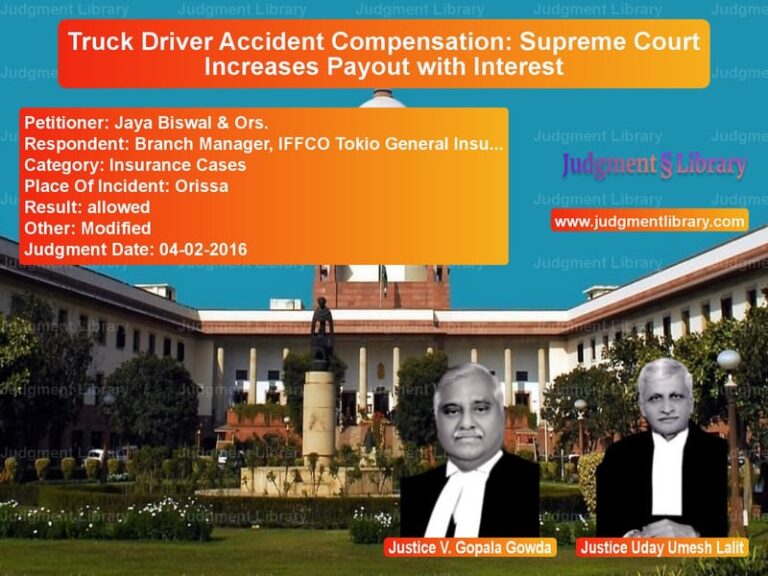Supreme Court Orders Fresh Review in Bank Employee Dismissal Case: Key Takeaways on Disciplinary Proceedings
The Supreme Court of India, in its detailed judgment in The Uttar Bihar Gramin Bank & Ors. vs. Narendra Kumar Sinha, delivered on October 3, 2018, provided a crucial ruling on disciplinary proceedings, employee dismissal, and judicial intervention. The case revolved around the dismissal of a bank employee following a departmental inquiry and raised significant legal questions on procedural fairness, appellate authority powers, and the extent to which courts can interfere in employer-employee disputes.
This ruling serves as an essential precedent for service matters, clarifying how courts should handle judicial review in cases involving disciplinary actions taken by public sector banks or other organizations.
Background of the Case
The dispute arose when Narendra Kumar Sinha, an employee of Uttar Bihar Gramin Bank, was dismissed from service through an order issued on April 16, 2011. The dismissal was a result of disciplinary proceedings initiated against him for professional misconduct.
The key allegations against Sinha were:
- Charge No. 1: Misappropriation of funds and fraudulent financial transactions.
- Charge No. 2: Violation of banking regulations leading to financial losses for the bank.
- Charge No. 3: Failure to follow due diligence in official duties, resulting in irregularities.
Following his dismissal, Sinha challenged the decision before the appellate authority of the bank, which upheld the dismissal on January 13, 2012. Dissatisfied with the outcome, he filed a writ petition before the Patna High Court, challenging the legality and correctness of the dismissal order.
Arguments by the Petitioner (Uttar Bihar Gramin Bank)
The bank, as the petitioner in the Supreme Court, defended its decision to dismiss Sinha based on the following arguments:
- The dismissal was carried out through a properly conducted departmental inquiry in compliance with established service rules.
- All three charges against Sinha were found to be proven after a fair hearing.
- The appellate authority had independently reviewed the case and upheld the findings of the inquiry.
- The High Court’s interference in the matter was unwarranted, as disciplinary matters should primarily be handled by the employer.
Arguments by the Respondent (Narendra Kumar Sinha)
Sinha, the dismissed bank employee, contested his termination on the following grounds:
- The disciplinary proceedings were not conducted fairly, and the evidence used against him was insufficient.
- The appellate authority failed to consider critical facts before upholding the dismissal.
- Charge No. 2, which was a key reason for his dismissal, was wrongly held against him without substantial proof.
- Since Charge No. 2 was unsubstantiated, his dismissal should be set aside.
High Court’s Ruling
The Single Judge Bench of the Patna High Court ruled in favor of Sinha on October 18, 2012, setting aside the appellate authority’s decision and remanding the case for reconsideration.
However, after reconsideration, the appellate authority again dismissed Sinha’s appeal on July 6, 2013. Sinha challenged this fresh dismissal order in another writ petition, C.W.J.C. No. 25672 of 2013.
The Division Bench of the Patna High Court, in its subsequent ruling, also ruled in favor of Sinha, setting aside the dismissal order and directing that the case be reconsidered.
Supreme Court’s Analysis and Judgment
The Supreme Court took up the case to assess whether the High Court was justified in interfering with the disciplinary proceedings and whether procedural fairness had been followed in Sinha’s dismissal.
Key Observations of the Court
- The Single Judge Bench of the High Court had only examined Charge No. 2 while ignoring Charges No. 1 and No. 3, which had also been held against Sinha.
- Since the departmental inquiry had proven all three charges, the High Court should have reviewed the entire case rather than focusing on just one charge.
- The Division Bench of the High Court erred by remanding the case back to the disciplinary authority instead of deciding it on merits.
Final Ruling
- The Supreme Court set aside the judgments of both the Single Judge and Division Bench of the High Court.
- The writ petition (C.W.J.C. No. 25672 of 2013) was restored for fresh adjudication by the High Court.
- The Supreme Court directed the High Court to decide the matter on merits without being influenced by its previous observations.
Impact of the Judgment
This ruling has significant implications for service matters and disciplinary proceedings:
- Courts must review all charges rather than selectively focusing on some.
- Judicial intervention should be limited to cases where there is gross procedural unfairness.
- The appellate authority in disciplinary matters must thoroughly examine the evidence before making a final decision.
Conclusion
The Supreme Court’s ruling in The Uttar Bihar Gramin Bank vs. Narendra Kumar Sinha reinforces the need for procedural fairness in employee dismissals while also emphasizing that courts should not intervene excessively in employer-employee disputes. The case has now been remanded to the High Court for a fresh adjudication, ensuring that the matter is thoroughly examined before a final verdict is reached.
Petitioner Name: The Uttar Bihar Gramin Bank & Ors..Respondent Name: Narendra Kumar Sinha.Judgment By: Justice Abhay Manohar Sapre, Justice Uday Umesh Lalit.Place Of Incident: Bihar.Judgment Date: 03-10-2018.
Don’t miss out on the full details! Download the complete judgment in PDF format below and gain valuable insights instantly!
Download Judgment: The Uttar Bihar Gram vs Narendra Kumar Sinha Supreme Court of India Judgment Dated 03-10-2018.pdf
Direct Downlaod Judgment: Direct downlaod this Judgment
See all petitions in Disciplinary Proceedings
See all petitions in Public Sector Employees
See all petitions in Termination Cases
See all petitions in Judgment by Abhay Manohar Sapre
See all petitions in Judgment by Uday Umesh Lalit
See all petitions in allowed
See all petitions in Remanded
See all petitions in supreme court of India judgments October 2018
See all petitions in 2018 judgments
See all posts in Service Matters Category
See all allowed petitions in Service Matters Category
See all Dismissed petitions in Service Matters Category
See all partially allowed petitions in Service Matters Category







